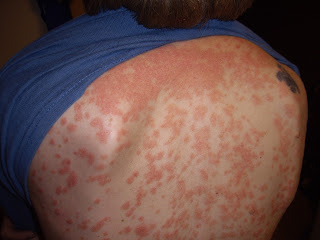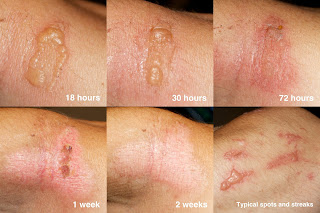Eczema is an inflammatory lesion on the skin.
This lesion usually occurs because of a contact dermatitis caused by a substance or an endogenous dermatitis, caused by a reaction of the body such as atopic dermatitis.
 |
| What Is Eczema - Eczema Definition |
Eczema or dermatitis is usually classified as:
• Atopic: Atopic eczema may have many variations, but in general characterized by plates of Red scabs of skin inflamed with constant itching.
• Seborrheic: Seborrheic dermatitis is a common inflammatory disease of the skin characterized by squamous lesions usually on the scalp and face.
• Contact: contact dermatitis is the name given to any inflammation of the skin that occurs when the surface of the skin comes into contact with a substance that originates outside the body.
Types of dermatitis:
CONTACT DERMATITIS
Eczema or contact dermatitis (ad) are caused by an inflammation of the skin to come into contact with irritative substances.Sometimes can be caused by an immune response from the body itself, in that case refers to allergic contact dermatitis.
How much is a substance that enters directly in contact with the skin and irritate it is spoken of irritant contact dermatitis.
In these cases of contact dermatitis, eczema develops only in the affected area.
What substances cause an allergic contact dermatitis (DCA)?
Nickel is one of the substances causing the DCA more frequently. It is present many times in jewellery or accessories such as belts and shoes. If we notice an irritation in the lobe of the ear, wrist, finger or belly button, check if these areas can be in contact with any element that can carry nickel.
Chrome is another substance that often cause allergic reactions. This often present on leather objects and substances such as cement, so it is a frequent cause of DCA among construction workers.
We can also find dermatitis-causing substances in cosmetic products. Fragrances, preservatives, creams, soaps, etc. All of them may contain substances such as: (geraniol, isoeugenol, lyral, kathon, formaldehyde, euxyl K, etc.) and other excipients that can cause an allergic reaction.
But many substances can be the cause of a DC: certain plants, some medicines, dyes, preservatives or even dyes can cause a reaction.
Many substances can be responsible for a DCA: plants, adhesives, medicines, rubber, dyes for the hair, etc. All of them cause an eczema in the area where the allergy-causing substance penetrates in greater quantity in the skin.
If, for example, a person is allergic to a dye you can generate an allergy in the scalp or in areas that come into contact with the dye, as the neck, eyelids, etc.
A person who is allergic to latex may suffer eczema on the hands. In fact this is one of the most common skin problems among health professionals.
The symptoms and the causes are often difficult to diagnose and it is always advisable to go to a specialist. Self-medication can be useless and even harmful to the health of the skin.
The contact dermatitis irritant (DCI) occurs when aggressive substances cause a skin reaction to being in contact with it.
Soaps, perfumes and chemicals such as bleach or cleaners are causing more contact dermatitis. Logically the most affected parts of the body are hands.
To properly treat dermatitis, it is important to first identify the causative agent and replace it, if it is possible, by another product that is not irritant or adequately protect the skin surface against that product.
Also here it is very important to go to a dermatologist so you can prescribe the proper treatment.
You can read another articles like How To Get Rid Of Eczema Scars, How To Treat Eczema, Natural Remedies, Types Of Eczema, Varicose Eczema.
eczema definition
eczema eczema
dermatitis treatment





